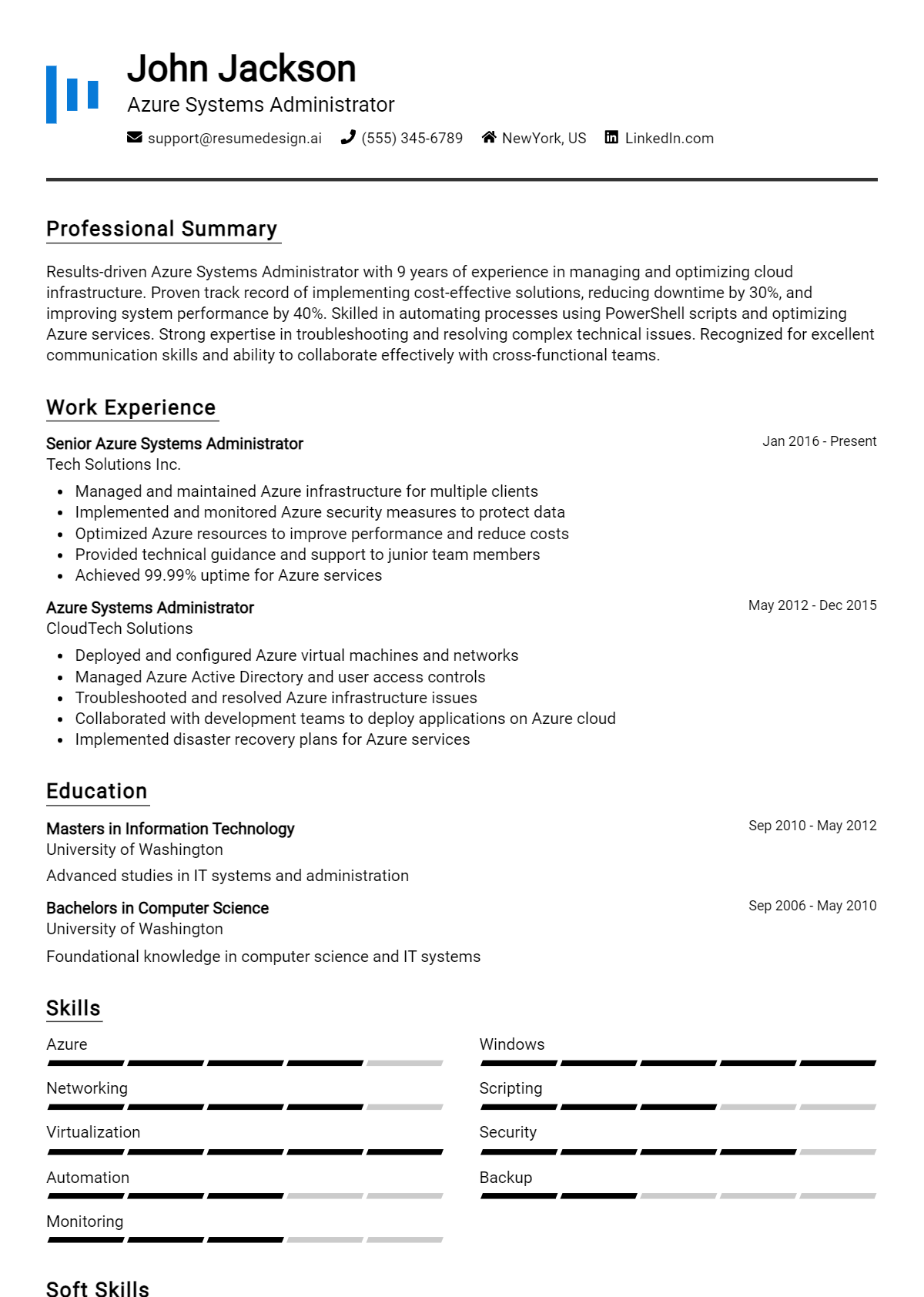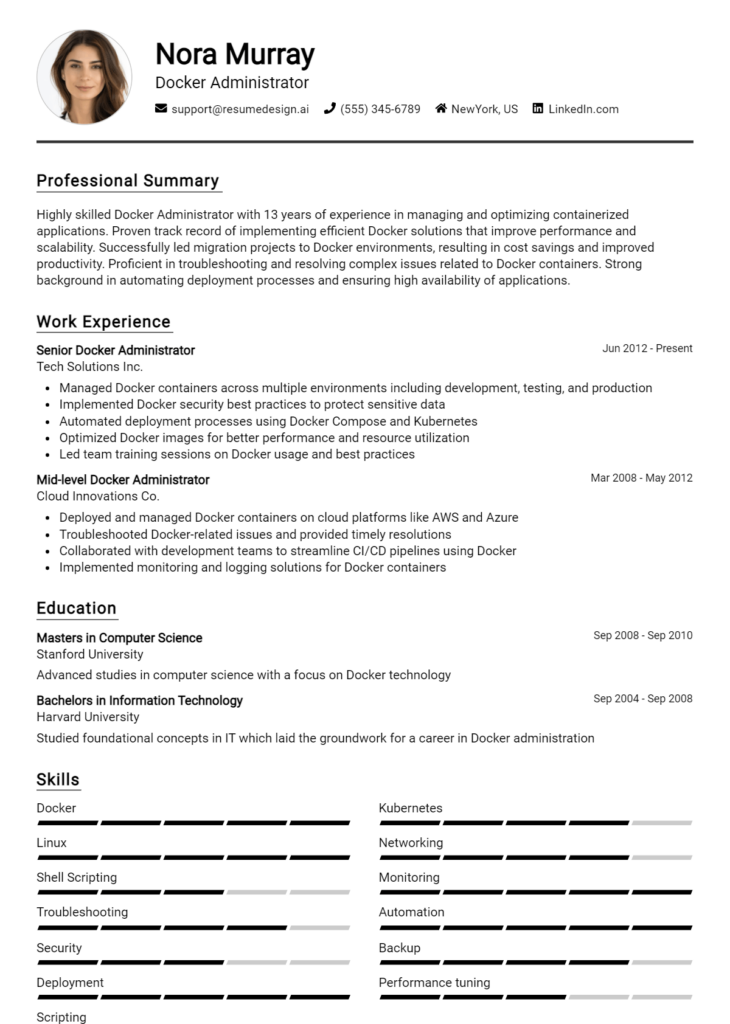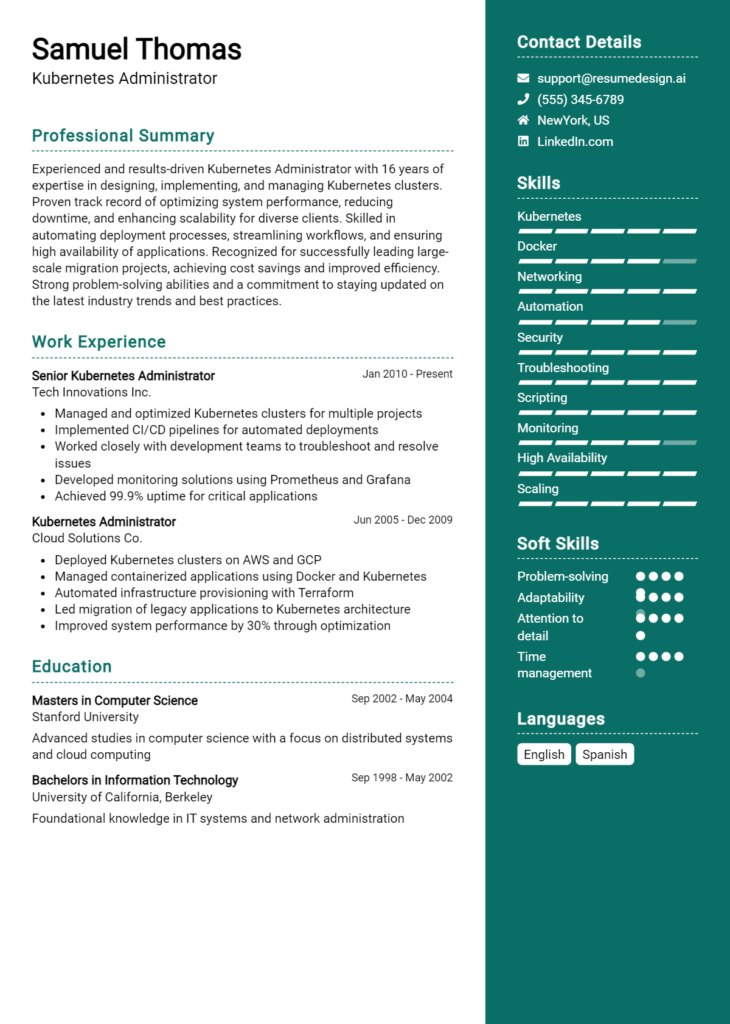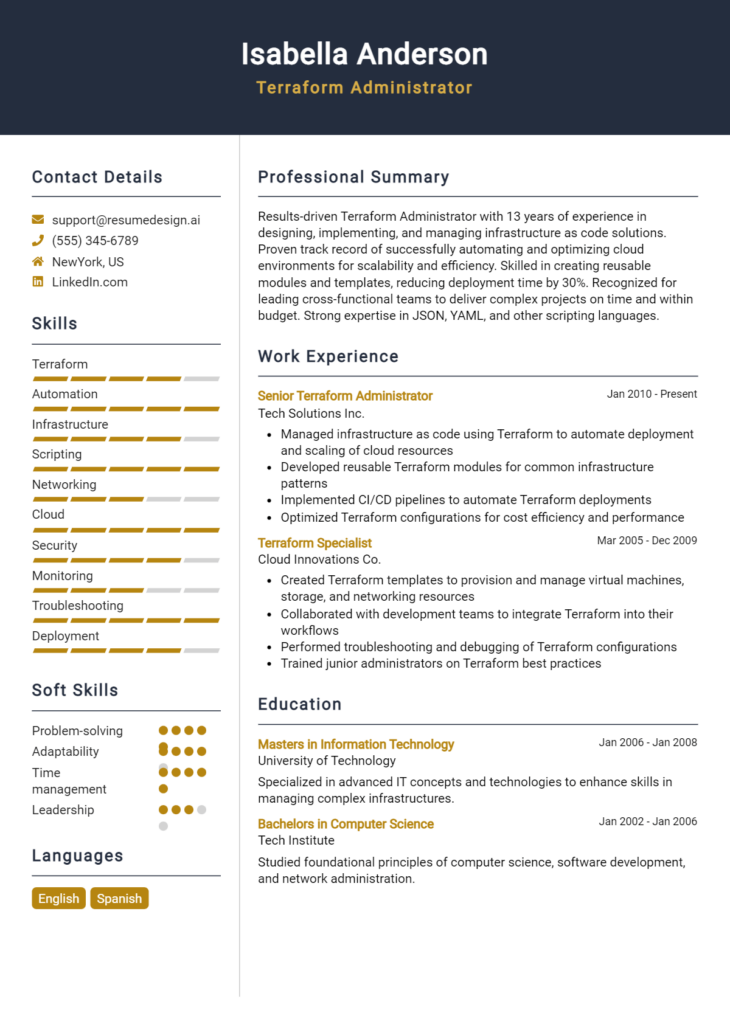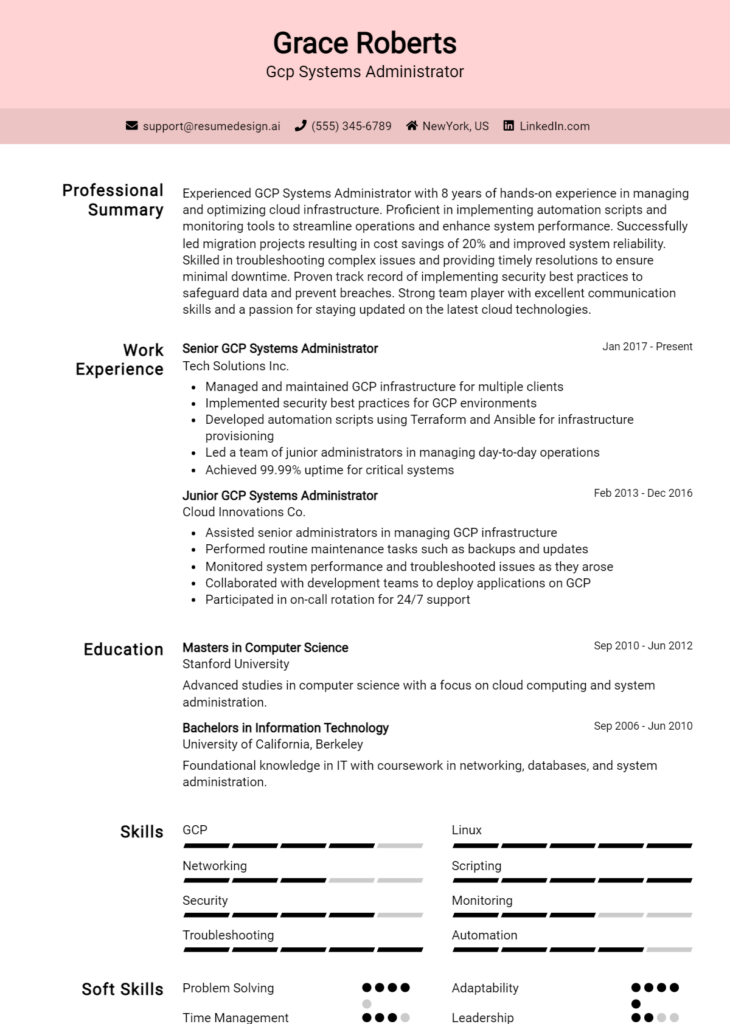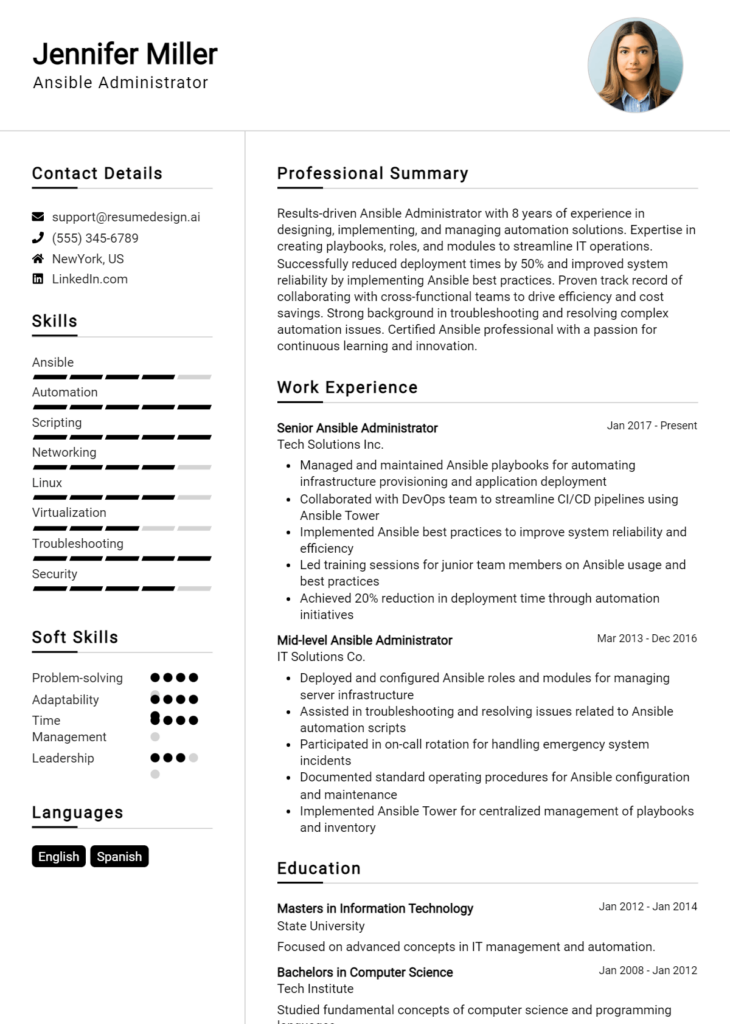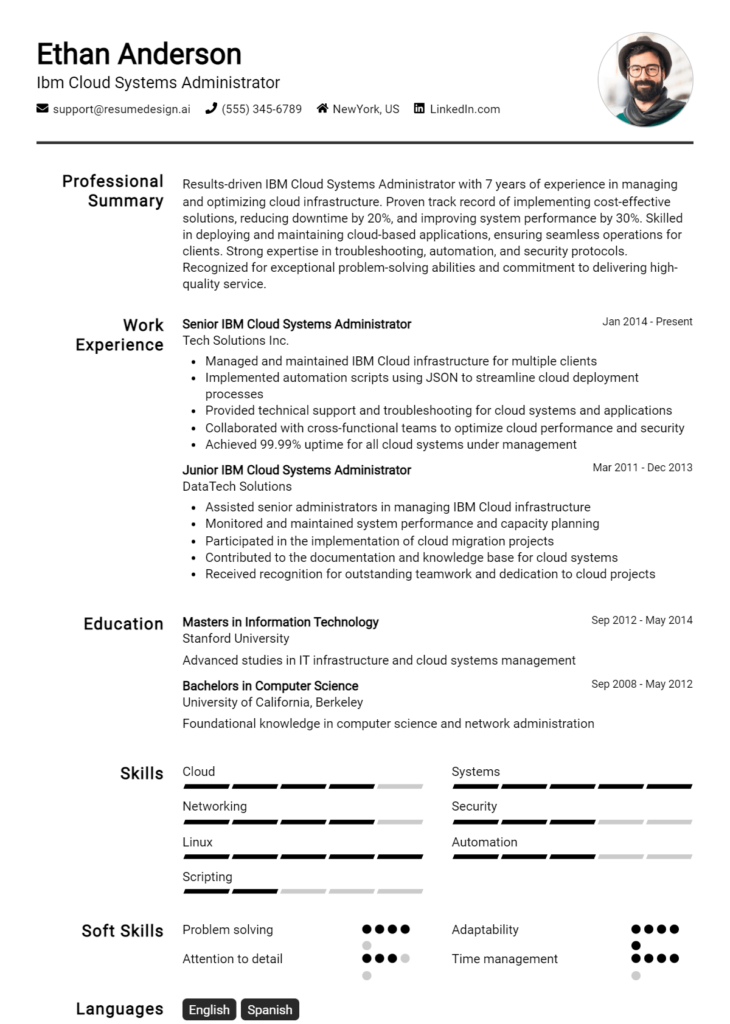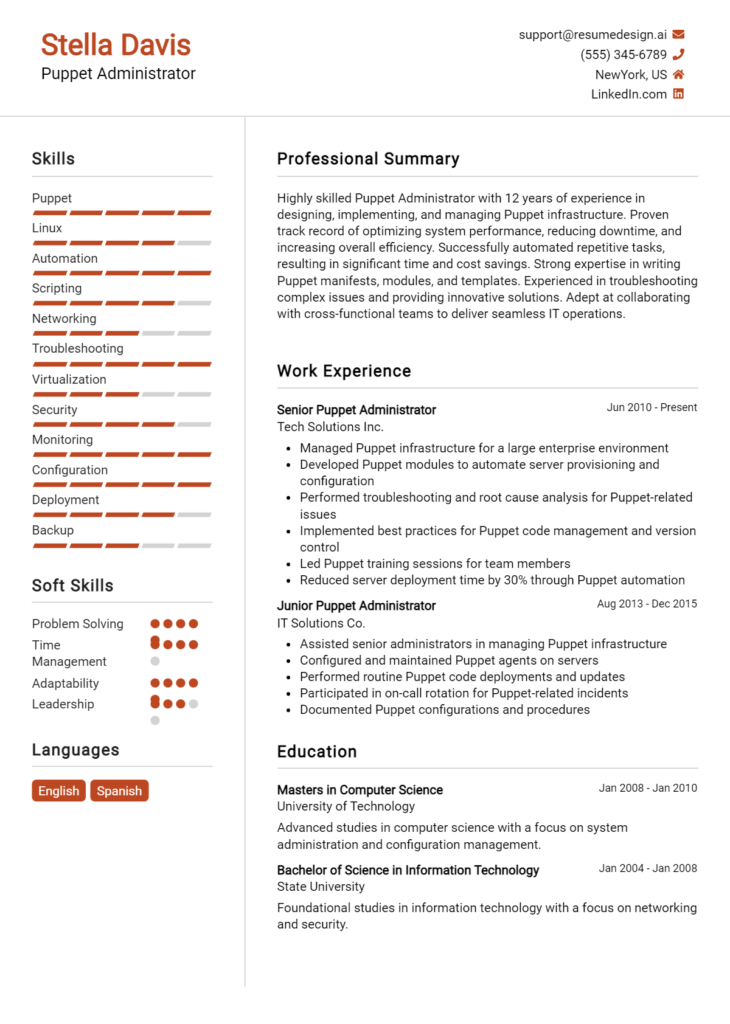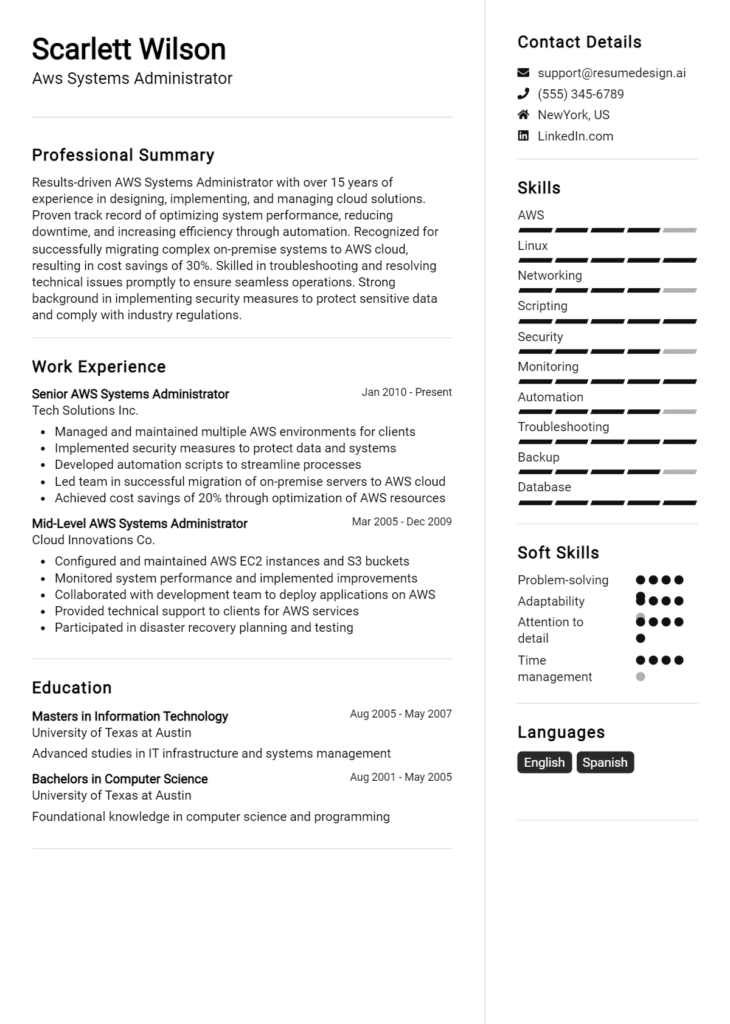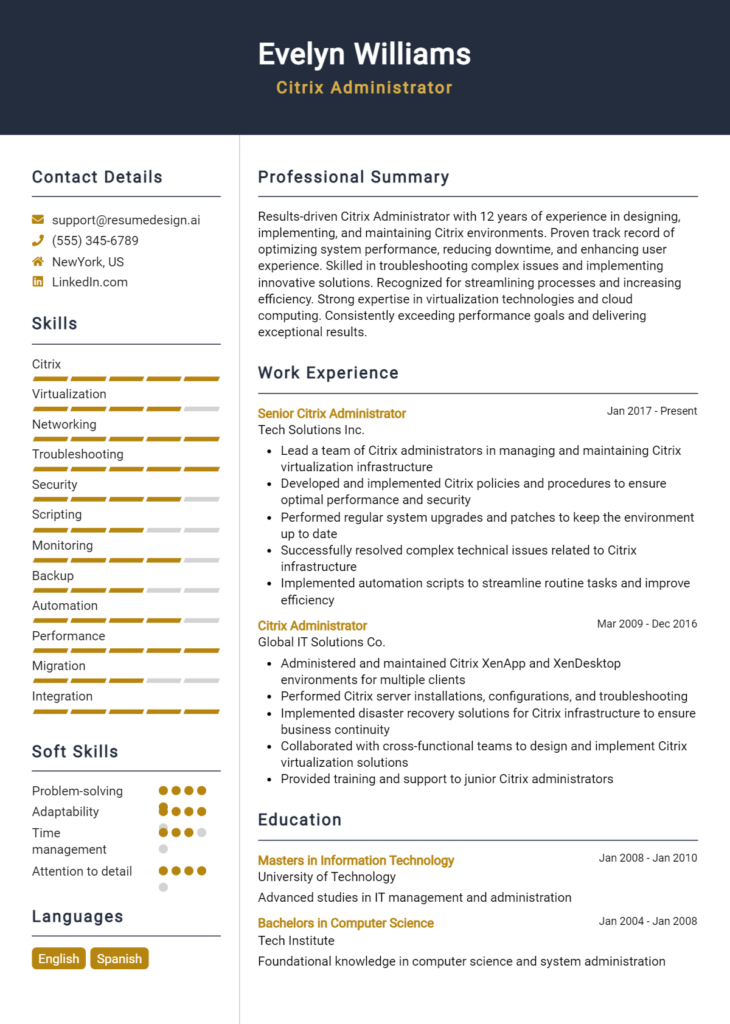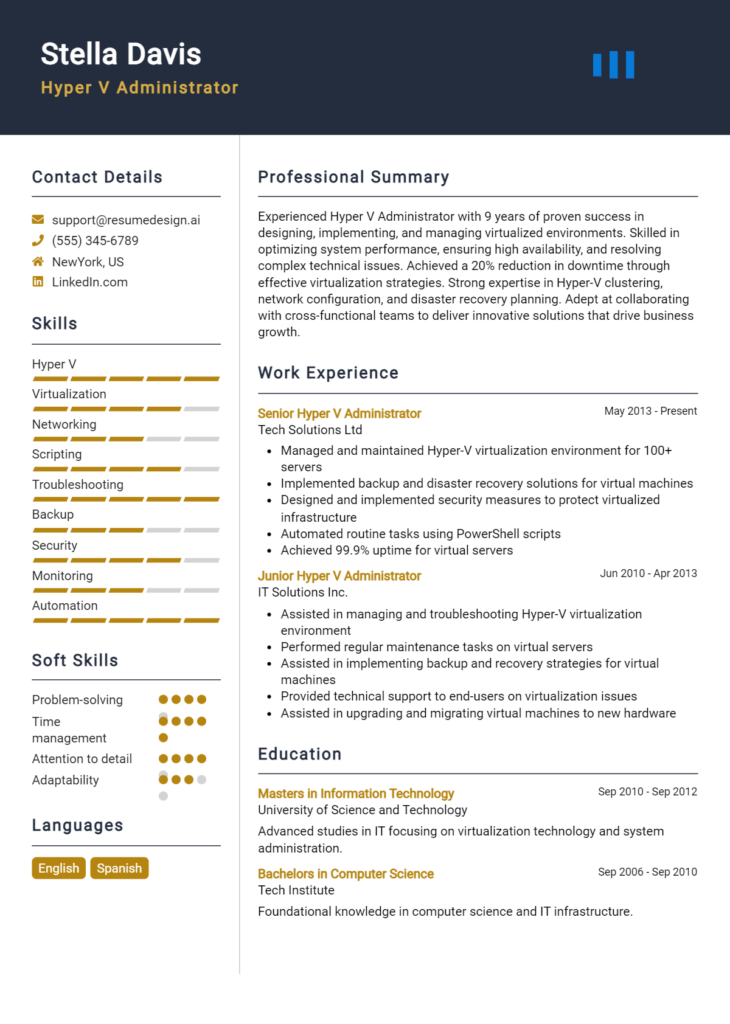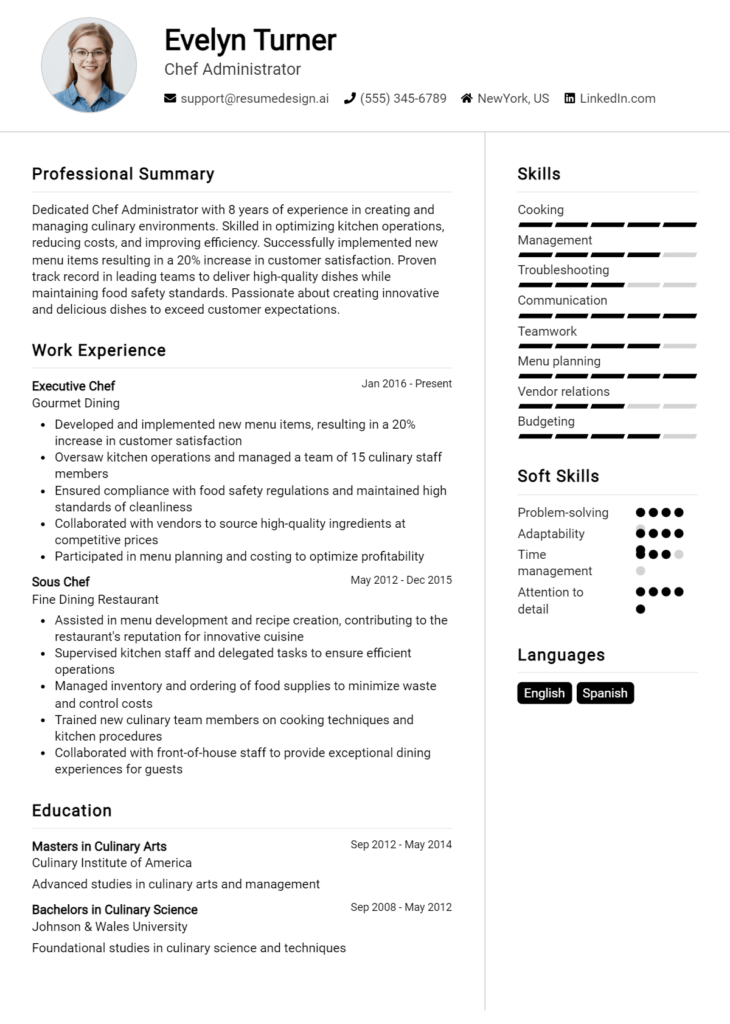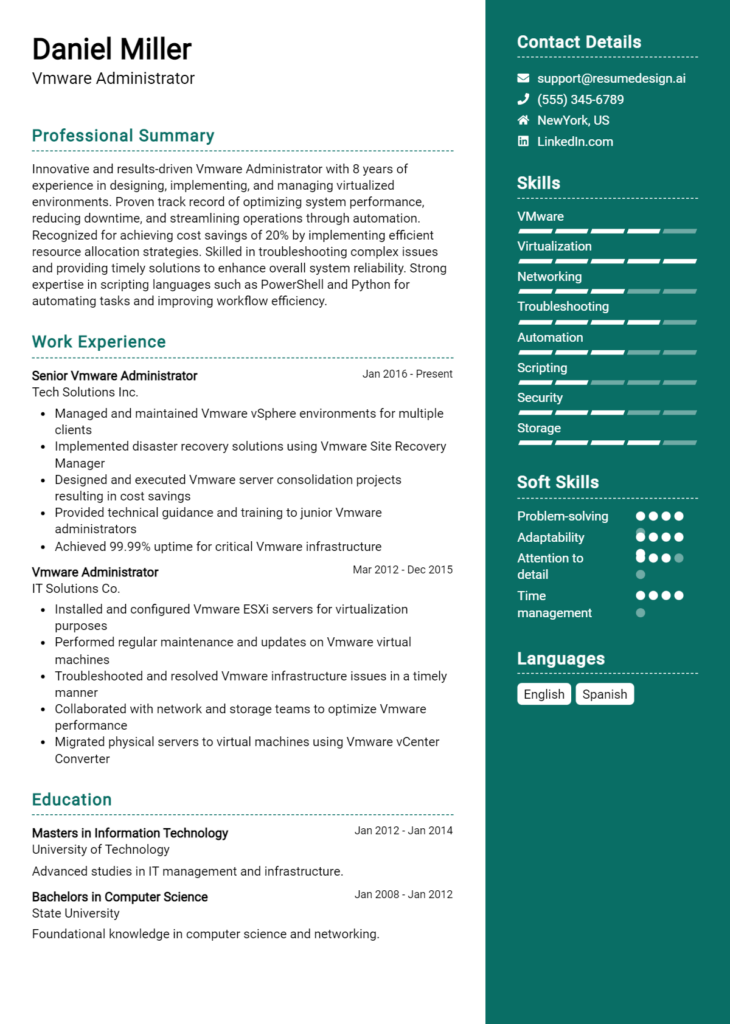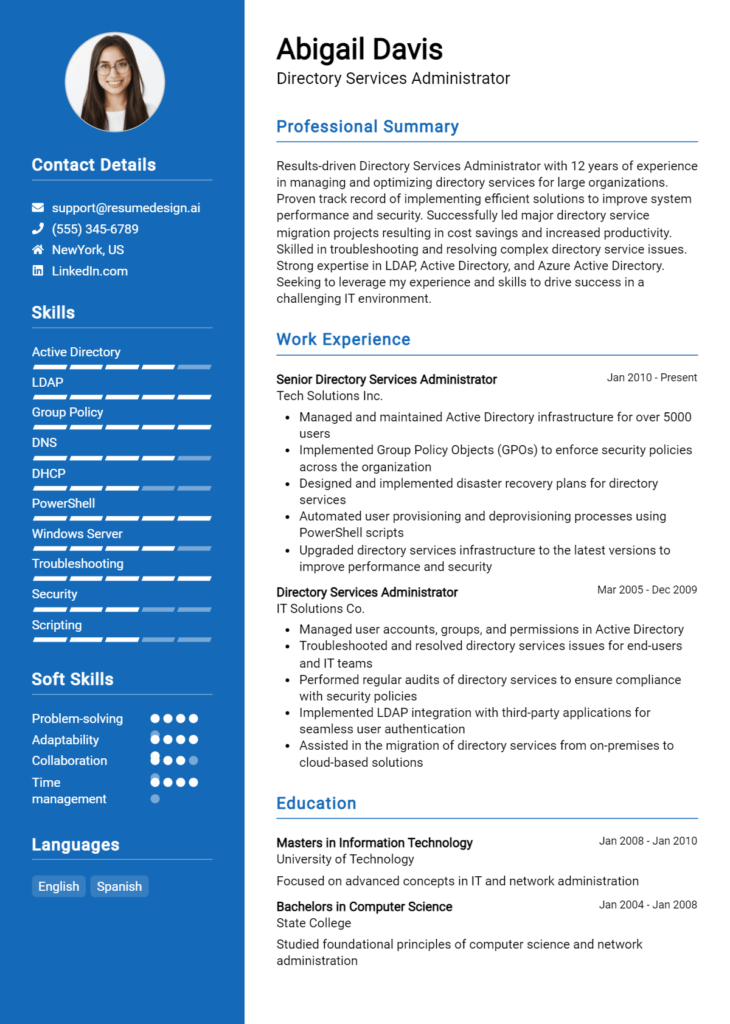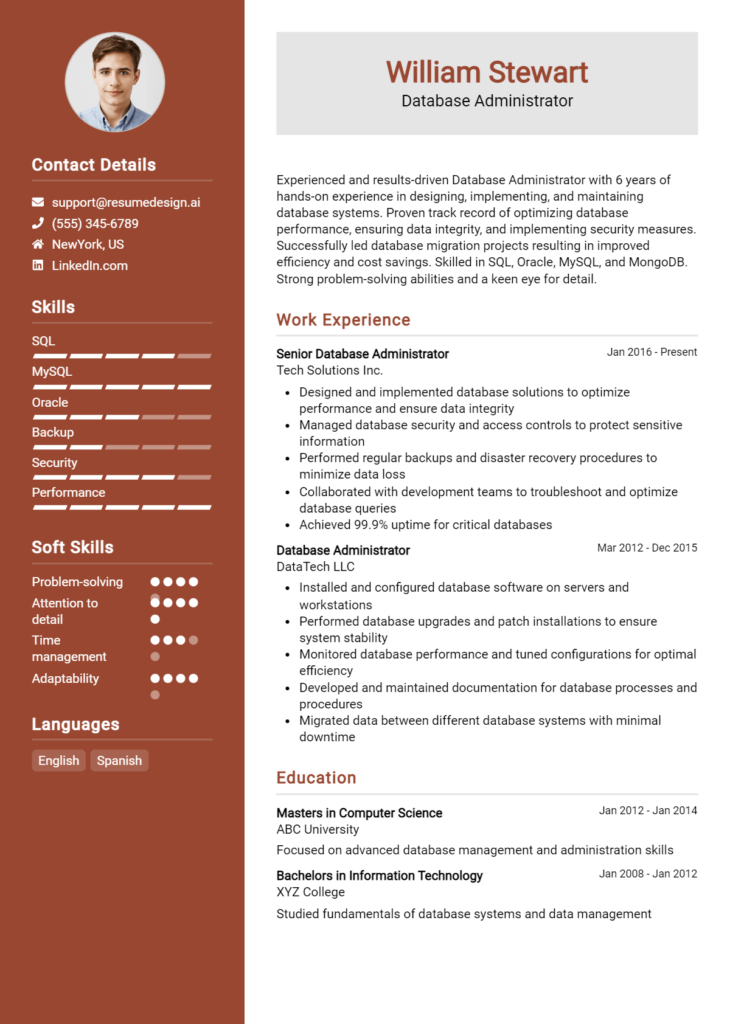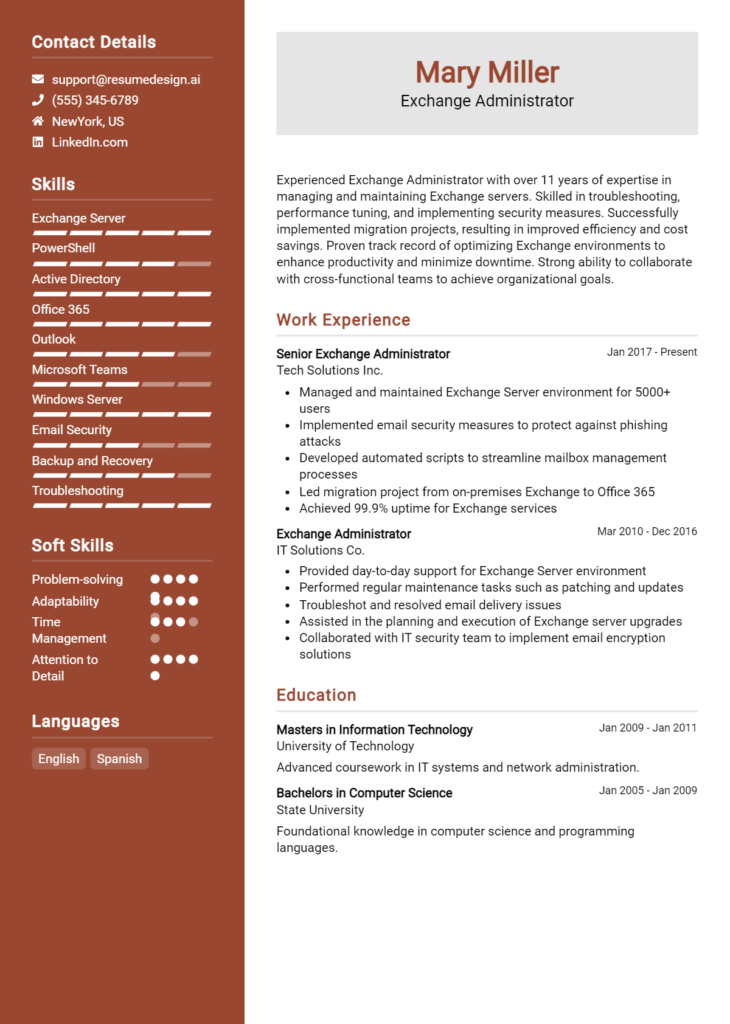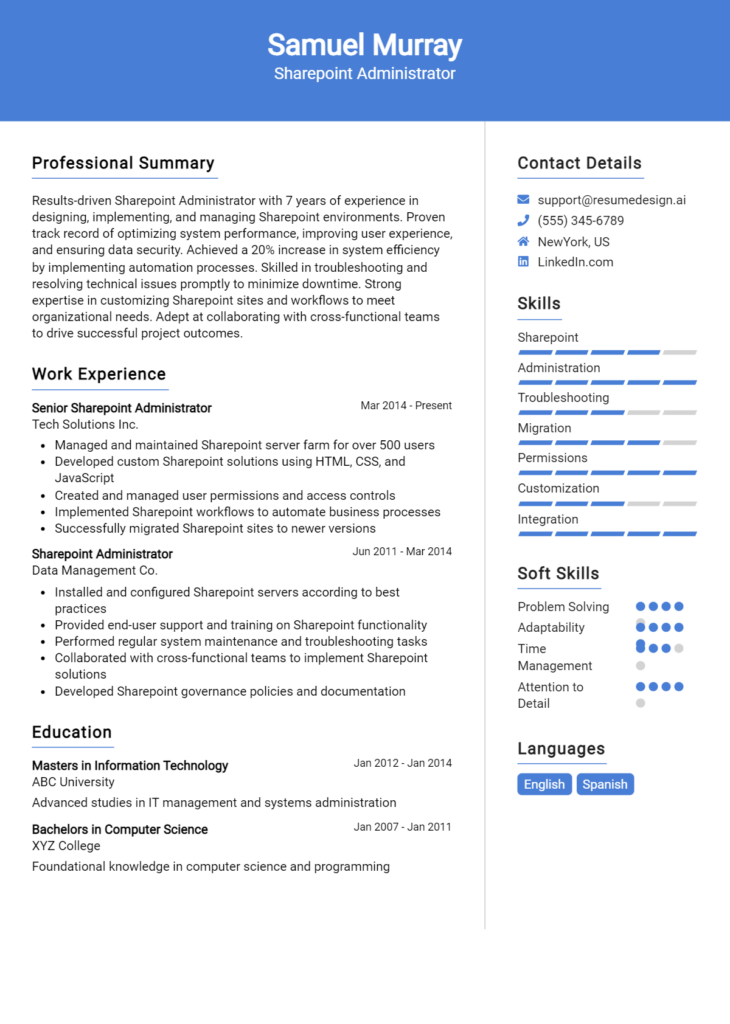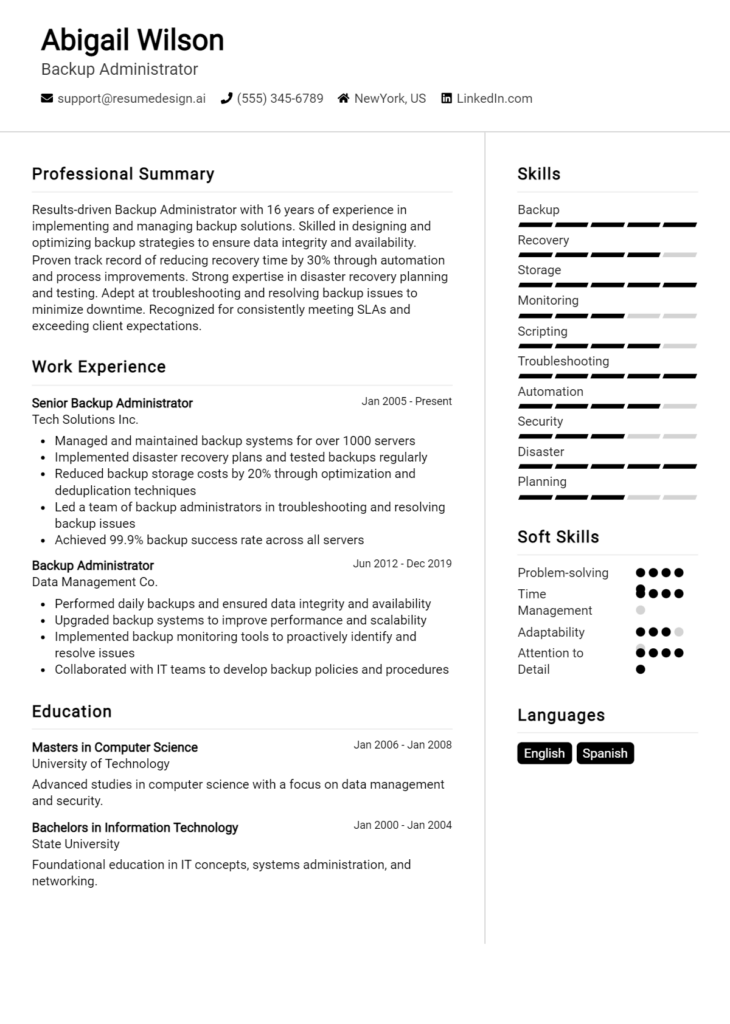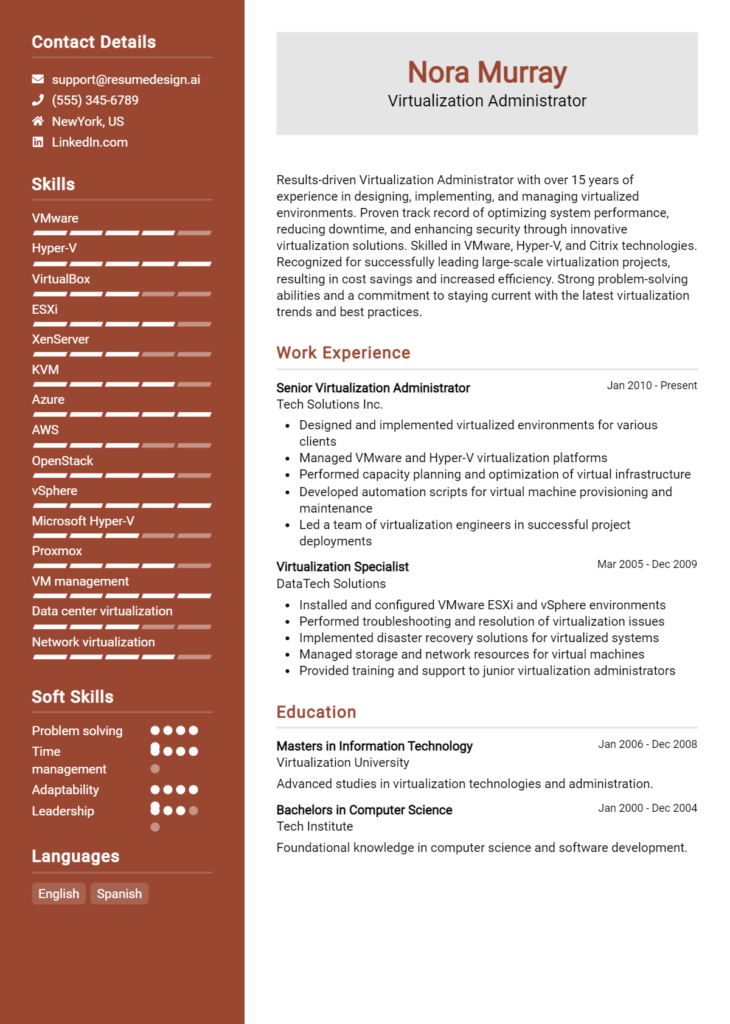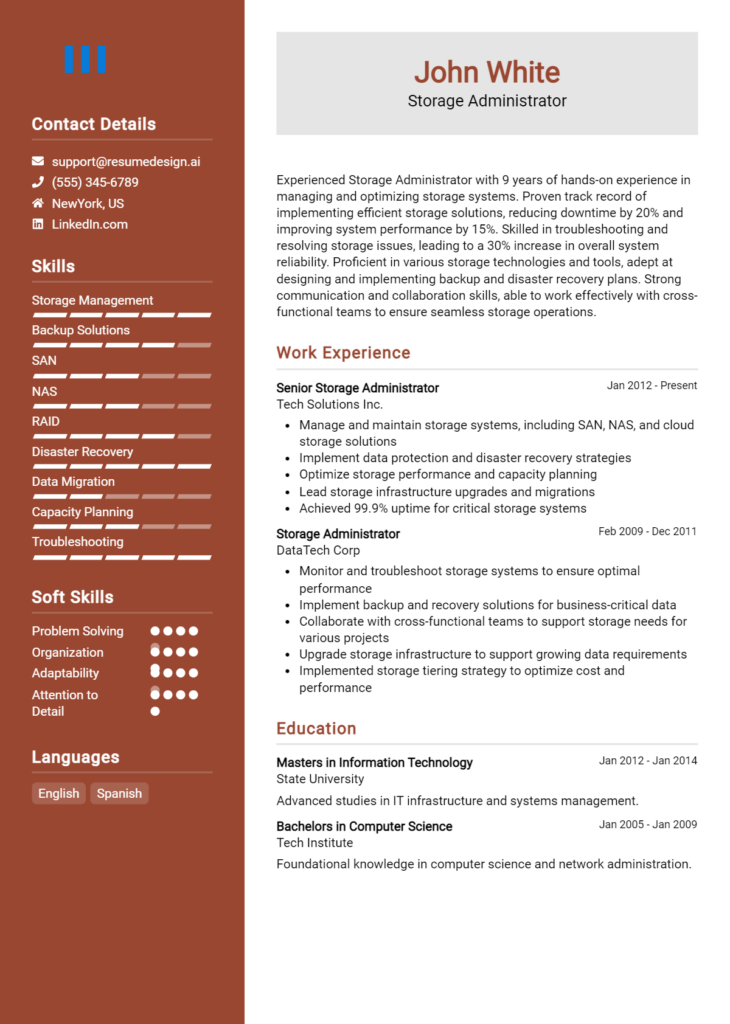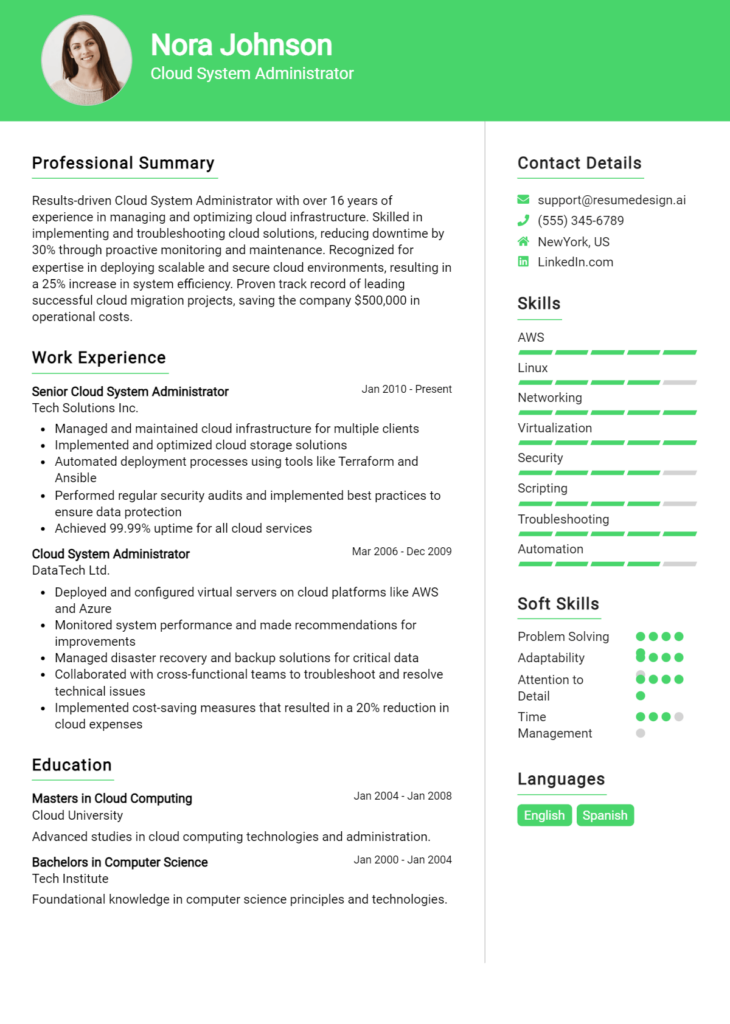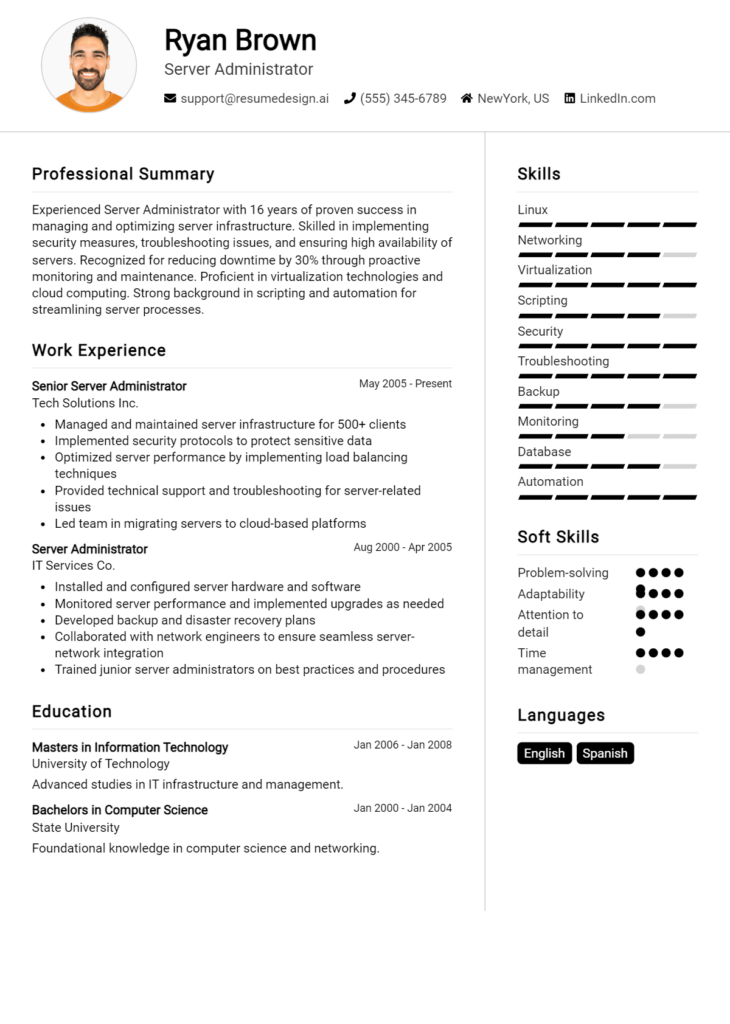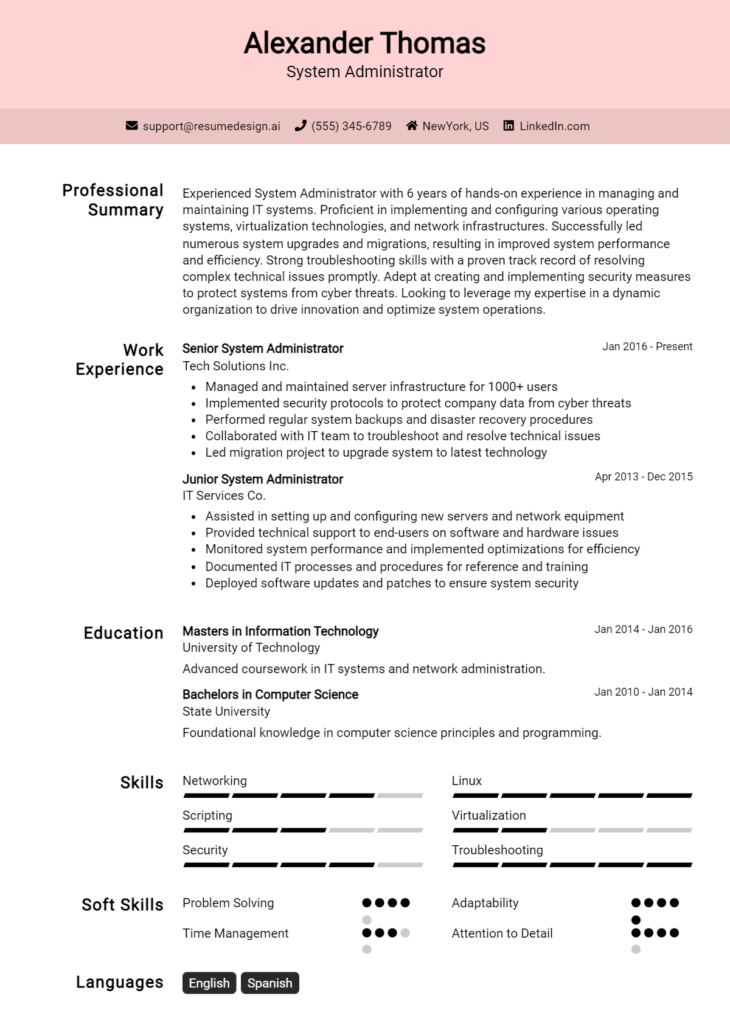Azure Systems Administrator Core Responsibilities
An Azure Systems Administrator plays a crucial role in managing cloud-based systems and ensuring operational efficiency across various departments. Key responsibilities include deploying, managing, and monitoring Azure resources while maintaining system security and performance. Essential skills encompass technical expertise in cloud architecture, operational proficiency, and strong problem-solving abilities. These competencies not only enhance collaboration among teams but also align with organizational objectives. A well-structured resume can effectively highlight these qualifications, making candidates stand out in a competitive job market.
Common Responsibilities Listed on Azure Systems Administrator Resume
- Deploying and configuring Azure virtual machines and networks.
- Monitoring system performance and optimizing resources.
- Implementing security protocols and compliance measures.
- Conducting regular system backups and disaster recovery planning.
- Collaborating with development teams to ensure seamless application deployment.
- Managing user access and permissions within Azure environments.
- Automating routine tasks using PowerShell and Azure CLI.
- Troubleshooting and resolving technical issues related to Azure services.
- Maintaining documentation for system configurations and changes.
- Staying updated on Azure updates and best practices.
- Providing technical support and training to end-users.
High-Level Resume Tips for Azure Systems Administrator Professionals
In today's competitive job market, a well-crafted resume is essential for Azure Systems Administrator professionals seeking to make a lasting impression on potential employers. Often the first point of contact between a candidate and a hiring manager, your resume serves as a powerful marketing tool that showcases not only your technical skills but also your notable achievements in the field. A targeted and polished resume can effectively communicate your value proposition and set you apart from the competition. This guide aims to provide practical and actionable resume tips specifically tailored for Azure Systems Administrator professionals, ensuring that your first impression is a stellar one.
Top Resume Tips for Azure Systems Administrator Professionals
- Tailor your resume to align with the specific job description, emphasizing the skills and experiences most relevant to the position.
- Showcase your experience with Azure services, such as Azure Active Directory, Azure DevOps, and Azure Storage, detailing specific projects or tasks.
- Quantify your achievements with metrics, such as percentage improvements in system performance or reductions in downtime.
- Highlight your certifications, such as Microsoft Certified: Azure Administrator Associate, to validate your expertise in the Azure ecosystem.
- Include keywords from the job posting throughout your resume to improve chances of passing Applicant Tracking Systems (ATS).
- Demonstrate your problem-solving skills by including examples of how you addressed challenges in previous roles.
- Focus on both technical skills (like PowerShell scripting and cloud security) and soft skills (like teamwork and communication) that are crucial for the role.
- Use a clean and professional format, ensuring that your resume is easy to read and visually appealing.
- Consider adding a summary or objective statement that succinctly conveys your career goals and what you bring to the table.
By implementing these tips, you can significantly enhance your resume, making it a compelling representation of your skills and experiences in the Azure Systems Administrator field. A strong resume not only increases your chances of catching the eye of hiring managers but also positions you as a qualified candidate ready to take on the challenges of the role.
Why Resume Headlines & Titles are Important for Azure Systems Administrator
In the competitive landscape of job applications, a well-crafted resume headline or title is crucial for an Azure Systems Administrator. This brief yet impactful phrase serves as the first impression for hiring managers, providing an immediate insight into the candidate's qualifications and relevance to the role. A strong headline can effectively summarize key skills and experiences, making it easier for employers to identify top talent among numerous applicants. It is essential that these headlines are concise, relevant, and tailored specifically to the Azure Systems Administrator position to capture attention and convey professionalism.
Best Practices for Crafting Resume Headlines for Azure Systems Administrator
- Keep it concise—aim for one impactful phrase.
- Use industry-specific keywords relevant to Azure and systems administration.
- Highlight your most significant achievement or skill.
- Make it role-specific to align with the job description.
- Incorporate action verbs that demonstrate your capabilities.
- Avoid jargon and complex language that may confuse the reader.
- Ensure it reflects your professional brand and value proposition.
- Tailor the headline for each application to match the job requirements.
Example Resume Headlines for Azure Systems Administrator
Strong Resume Headlines
"Certified Azure Administrator with 5+ Years of Experience in Cloud Solutions"
“Results-Driven Azure Systems Administrator Specializing in Infrastructure Optimization”
“Expert in Azure Management and Automation with Proven Track Record of Enhancing System Performance”
Weak Resume Headlines
“IT Professional Seeking Opportunities”
“Azure Systems Administrator”
Strong headlines are effective because they are specific, showcasing relevant skills and experiences that directly relate to the Azure Systems Administrator role. They convey confidence and expertise, making candidates stand out in a crowded job market. In contrast, weak headlines often lack specificity and fail to highlight unique strengths, making them unimpressive and forgettable. Generic titles do not engage hiring managers and may lead to missed opportunities, underscoring the importance of a focused and impactful headline.
Writing an Exceptional Azure Systems Administrator Resume Summary
A well-crafted resume summary is essential for an Azure Systems Administrator as it serves as the first impression for hiring managers. This brief yet impactful paragraph has the power to quickly capture attention by highlighting key skills, relevant experience, and notable accomplishments that align with the job requirements. A strong summary not only showcases the candidate's technical expertise in Azure environments but also emphasizes their ability to contribute effectively to the organization. It should be concise, powerful, and specifically tailored to the position being applied for, ensuring that it stands out in a competitive job market.
Best Practices for Writing a Azure Systems Administrator Resume Summary
- Quantify Achievements: Use specific numbers and results to demonstrate the impact of your work.
- Focus on Skills: Highlight the most relevant technical and soft skills that match the job description.
- Tailor the Summary: Customize your summary for each application to align with the specific requirements of the role.
- Keep it Concise: Aim for 3-5 sentences that deliver a strong message without overwhelming the reader.
- Use Action Words: Start sentences with dynamic verbs to convey confidence and proactivity.
- Showcase Relevant Certifications: Include any relevant Azure certifications that bolster your qualifications.
- Highlight Problem-Solving Abilities: Mention specific challenges you’ve tackled and how you overcame them.
- Maintain Professional Tone: Ensure the language reflects professionalism and competence in the field.
Example Azure Systems Administrator Resume Summaries
Strong Resume Summaries
Dedicated Azure Systems Administrator with over 5 years of experience optimizing cloud infrastructures, leading to a 30% reduction in operational costs. Proficient in Azure DevOps, automation scripts, and monitoring solutions, ensuring seamless deployment and uptime for mission-critical applications.
Results-driven Azure Systems Administrator specialized in deploying and managing cloud solutions for enterprise-level organizations. Successfully migrated over 200 applications to Azure, achieving a 99.9% uptime while enhancing security protocols.
Skilled Azure Systems Administrator with extensive experience in troubleshooting and resolving complex technical issues. Improved system performance by 40% through the implementation of automated processes and regular system audits.
Weak Resume Summaries
Experienced Systems Administrator with knowledge of cloud technologies. Looking for a challenging role to utilize my skills.
Azure professional with some experience in managing cloud services. I am eager to contribute to a team.
The strong resume summaries are considered effective because they provide specific achievements, quantify results, and directly relate to the responsibilities of an Azure Systems Administrator. They clearly demonstrate the candidate's expertise and impact within prior roles. Conversely, the weak summaries lack detail, do not quantify outcomes, and fail to convey a strong understanding of the candidate's qualifications, making them less compelling to hiring managers.
Work Experience Section for Azure Systems Administrator Resume
The work experience section of an Azure Systems Administrator resume is essential as it serves as a testament to the candidate's technical skills, project management abilities, and capacity to deliver high-quality IT solutions. This section allows potential employers to gauge the candidate's hands-on experience with Azure services, their proficiency in managing teams, and their success in driving projects to completion. By quantifying achievements and aligning their experiences with industry standards, candidates can effectively demonstrate their value and readiness for the role.
Best Practices for Azure Systems Administrator Work Experience
- Highlight relevant technical skills, including Azure services, scripting languages, and cloud management tools.
- Quantify achievements by including metrics such as uptime percentages, cost savings, or performance improvements.
- Use action verbs to describe responsibilities and accomplishments to convey a sense of proactivity.
- Showcase collaboration by mentioning teamwork in cross-functional projects or leading initiatives.
- Tailor your experience to match the job description, emphasizing aspects most relevant to the role.
- Include certifications and training related to Azure to bolster credibility and expertise.
- Keep descriptions concise and focused on outcomes that align with business goals.
- Utilize bullet points for clarity and ease of reading, ensuring that the most impactful experiences stand out.
Example Work Experiences for Azure Systems Administrator
Strong Experiences
- Implemented an Azure-based disaster recovery solution that improved system availability by 30%, significantly reducing downtime during outages.
- Led a team of 5 in migrating on-premises applications to Azure, resulting in a 25% reduction in infrastructure costs and improved scalability.
- Automated deployment processes using Azure DevOps, decreasing deployment time by 40% and enhancing overall team productivity.
- Collaborated with cross-functional teams to design a secure Azure environment, achieving compliance with industry standards and reducing security incidents by 50%.
Weak Experiences
- Worked on cloud projects without specifying the role or contributions.
- Assisted with system administration tasks; no details about specific skills or technologies used.
- Participated in team meetings and discussions without indicating any measurable outcomes.
- Maintained Azure resources with no mention of any improvements or efficiencies achieved.
The examples labeled as strong are characterized by specific achievements and quantifiable outcomes that demonstrate the candidate's impact and technical expertise. They provide clear evidence of leadership and collaboration within projects, making them stand out to employers. Conversely, the weak experiences lack detail, measurable results, and clarity, which diminishes their effectiveness in showcasing the candidate's qualifications and contributions to previous roles.
Education and Certifications Section for Azure Systems Administrator Resume
The education and certifications section of an Azure Systems Administrator resume is crucial for showcasing a candidate's academic foundation and commitment to ongoing professional development. This section not only highlights relevant degrees but also emphasizes industry-recognized certifications that validate the candidate's expertise in Azure technologies and cloud environments. By including pertinent coursework and specialized training, applicants enhance their credibility and demonstrate their alignment with the specific requirements of the Azure Systems Administrator role. An effective education and certifications section can significantly influence hiring decisions, as employers often seek candidates who are well-versed in the latest technologies and best practices in the field.
Best Practices for Azure Systems Administrator Education and Certifications
- Focus on relevant degrees, such as Computer Science, Information Technology, or Cloud Computing.
- List industry-recognized certifications, including Microsoft Certified: Azure Administrator Associate or equivalent.
- Include any specialized training that pertains to Azure services, infrastructure management, or cloud security.
- Provide details on relevant coursework that showcases your hands-on experience with Azure technologies.
- Prioritize recent certifications to reflect the latest knowledge and skills in the rapidly evolving cloud landscape.
- Consider including professional development workshops or online courses that demonstrate continuous learning.
- Avoid listing certifications that are outdated or no longer relevant to the Azure environment.
- Tailor the education and certifications section to match the specific job requirements of the Azure Systems Administrator position.
Example Education and Certifications for Azure Systems Administrator
Strong Examples
- Bachelor of Science in Computer Science, University of XYZ, Graduated 2022
- Microsoft Certified: Azure Administrator Associate, Issued March 2023
- Relevant Coursework: Cloud Computing, Network Security, and Database Management
- Azure Fundamentals Learning Path, Microsoft Learn, Completed January 2023
Weak Examples
- Associate Degree in General Studies, Community College of ABC, Graduated 2019
- Certified Network Administrator (CNA), Issued in 2015
- Coursework: Introduction to Philosophy and Art History
- CompTIA A+ Certification, Issued in 2018
The strong examples listed demonstrate a clear alignment with the requirements and skills necessary for an Azure Systems Administrator role. They feature relevant degrees, up-to-date certifications, and coursework that directly relates to Azure technologies. In contrast, the weak examples lack specificity and relevance to the Azure environment, showcasing outdated certifications and unrelated coursework that do not support the candidate's qualifications for the position.
Top Skills & Keywords for Azure Systems Administrator Resume
As an Azure Systems Administrator, showcasing the right skills on your resume is crucial to stand out in a competitive job market. Employers look for a blend of technical and interpersonal abilities that ensure not only the effective management of Azure cloud environments but also seamless collaboration within teams. A well-crafted resume that highlights both hard and soft skills can significantly increase your chances of landing an interview. Leveraging specific key skills can demonstrate your proficiency in Azure systems and your ability to adapt to various situations, making you a valuable asset to potential employers.
Top Hard & Soft Skills for Azure Systems Administrator
Soft Skills
- Problem-solving
- Communication
- Team collaboration
- Time management
- Adaptability
- Critical thinking
- Attention to detail
- Customer service orientation
- Leadership
- Conflict resolution
Hard Skills
- Azure cloud services (IaaS, PaaS, SaaS)
- Virtualization technologies (Hyper-V, VMware)
- PowerShell scripting
- Azure Active Directory
- Networking concepts (DNS, VPN, VNet)
- Security and compliance management
- Backup and disaster recovery solutions
- Monitoring and performance tuning
- SQL Database management
- Infrastructure as Code (IaC) using ARM templates or Terraform
For more on essential skills and how to effectively present your work experience, consider tailoring your resume to highlight your unique qualifications in the context of the Azure Systems Administrator role.
Stand Out with a Winning Azure Systems Administrator Cover Letter
Dear [Hiring Manager's Name],
I am writing to express my interest in the Azure Systems Administrator position at [Company Name] as advertised on [where you found the job listing]. With a solid background in cloud infrastructure management and a passion for optimizing system performance, I am excited about the opportunity to contribute to your team. My hands-on experience with Microsoft Azure, coupled with my certifications and proactive approach to system administration, positions me as a strong candidate for this role.
In my previous role at [Previous Company Name], I successfully managed and maintained Azure environments, ensuring seamless operations and high availability of services. I implemented automation scripts using Azure PowerShell and Azure CLI, which reduced deployment times by 30% and minimized human error. Additionally, I played a pivotal role in migrating on-premises applications to Azure, enhancing scalability and performance while ensuring compliance with security best practices. My commitment to continuous learning has equipped me with the latest knowledge of Azure services, which I am eager to leverage at [Company Name].
Collaboration is key in a dynamic IT environment, and I pride myself on my ability to work effectively with cross-functional teams. I have led several projects that required close coordination with developers, network engineers, and stakeholders to deliver cloud solutions that meet business objectives. My proactive communication style and problem-solving skills have been instrumental in driving project success and fostering a culture of innovation. I am particularly drawn to [Company Name] because of its commitment to technological advancement and dedication to fostering professional growth.
I am excited about the possibility of bringing my expertise in Azure systems administration to [Company Name]. Thank you for considering my application. I look forward to the opportunity to discuss how my skills and experiences align with your team’s needs. Please feel free to contact me at [Your Phone Number] or [Your Email Address] to schedule a discussion.
Sincerely,
[Your Name]
[Your LinkedIn Profile] (if applicable)
Your Address
Common Mistakes to Avoid in a Azure Systems Administrator Resume
Crafting a resume for the Azure Systems Administrator role requires careful attention to detail and an understanding of what recruiters are looking for. Many candidates make common mistakes that can significantly diminish their chances of landing an interview. By avoiding these pitfalls, you can enhance your resume and better showcase your skills and experiences in managing Azure environments.
Vague Job Descriptions: Failing to provide specific details about your previous roles can leave hiring managers unclear about your actual responsibilities and accomplishments. Always quantify your achievements and specify your contributions.
Ignoring Relevant Certifications: Azure offers numerous certifications that validate your expertise. Neglecting to include these credentials may lead employers to question your qualifications, so be sure to highlight them prominently.
Overloading with Technical Jargon: While technical skills are essential for an Azure Systems Administrator, using too much jargon can alienate non-technical recruiters. Aim for a balance that showcases your expertise while remaining accessible.
Lack of Tailoring to the Job Description: Submitting a generic resume can be a major drawback. Tailor your resume to align with the specific requirements and keywords of the job description to make it more relevant.
Inadequate Emphasis on Soft Skills: Technical skills are crucial, but soft skills such as teamwork, communication, and problem-solving are equally important. Ensure you highlight these attributes to demonstrate you’re a well-rounded candidate.
Neglecting to Showcase Continuous Learning: The Azure platform is constantly evolving. If you don’t mention ongoing education, training, or participation in communities, it may suggest that you’re not keeping your skills up to date.
Failure to Include Relevant Projects: Not mentioning specific projects you have worked on can limit the visibility of your hands-on experience. Be sure to include details about significant projects that demonstrate your capabilities in Azure.
Formatting Issues: A cluttered or poorly formatted resume can be hard to read and may give a negative impression. Use a clean, professional layout with consistent fonts and headings to enhance readability.
Conclusion
As we wrap up our exploration of the Azure Systems Administrator role, it's clear that this position demands a diverse skill set, including proficiency in Azure services, cloud infrastructure management, and a solid understanding of networking and security protocols. The importance of staying updated with the latest Azure features and best practices cannot be understated, as this ensures optimal performance and security of cloud environments.
In addition to technical skills, soft skills such as problem-solving, communication, and teamwork play a crucial role in effectively managing Azure systems and collaborating with other IT professionals. The ability to adapt to new tools and technologies will set you apart in this ever-evolving field.
Now is the perfect time to review your Azure Systems Administrator resume to ensure it accurately reflects your skills, experiences, and accomplishments. Highlight your expertise in Azure services and any relevant certifications you have obtained.
To enhance your resume, consider utilizing resources such as resume templates, which can provide a professional layout, or the resume builder for a user-friendly experience in creating your document. Additionally, reviewing resume examples can offer inspiration and insight into what other successful Azure Systems Administrators have included in their resumes. Don’t forget to pair your resume with a compelling cover letter using our cover letter templates, which can help you make a strong first impression.
Take action today—revamp your resume and prepare to take the next step in your Azure Systems Administrator career!

